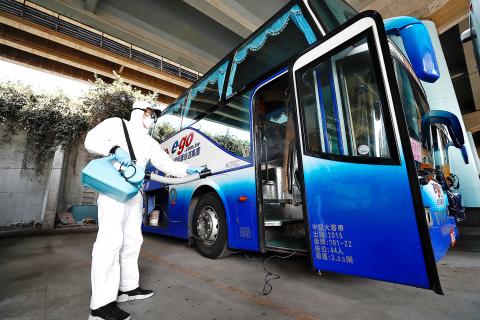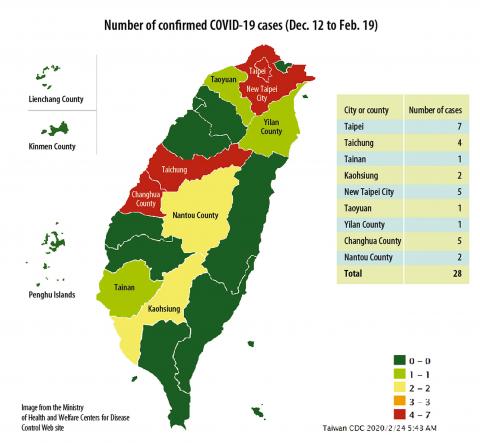The government’s travel notice for South Korea has been raised to a level 3 “warning” — avoid all nonessential travel — due to a jump in the number of COVID-19 cases there, the Central Epidemic Command Center (CECC) said yesterday, adding that two more cases have been confirmed in Taiwan.
The community spread of the virus in South Korea has been shown by the rapid increase in confirmed cases in the past few days, which totaled 763 yesterday, Minister of Health and Welfare Chen Shih-chung (陳時中) said.
“As the risk of infection is elevated in the country, the center decided to raise the travel notice to level 3,” said Chen, who serves as the center’s head. “We recommend people avoid all nonessential travel.”

Photo: Ritchie B. Tongo / EPA-EFE
As of 12am today, all foreign nationals arriving in Taiwan from South Korea would be placed under a 14-day mandatory home quarantine, he said.
Taiwanese passengers arriving today and tomorrow would be asked to implement a 14-day self-health management period, but as of 12am on Thursday, everyone arriving from South Korea would be put under a 14-day quarantine, he said.
The Ministry of Foreign Affairs issued an “orange” warning on travel to South Korea, advising people to avoid unnecessary travel to the nation, but issued the highest “red” warning on travel to Daegu, Gyeongsang-bukdo and Cheongdo-gun, where the South Korean government has declared special management zones, Chen said.

When asked if similar border controls would be imposed on passengers arriving from Japan, Chen said Japan is “on the edge of” being listed at a higher warning level.
The number of confirmed cases in Japan is relatively high, with locations spread across the nation, including Okinawa and Hokkaido, he said.
“The CECC is closely observing and discussing the COVID-19 epidemic situations in Japan, Singapore, Thailand, Italy and Iran, and we will make proper decisions if the outbreaks in these areas become worse,” he said.
The two new confirmed cases of COVID-19 in Taiwan, the 29th and 30th, are family members of the two cases announced on Sunday — an octogenarian father and one of his sons, who is in his 50s — the younger son and older man’s wife, he said, adding that a contact investigation into the family cluster infection is under way.
Chen confirmed that a Taiwanese hemophiliac, who had been stranded in Wuhan, China, with his mother since that city was locked down on Jan. 23, was to return to Taiwan on a flight from Chengdu last night.
The teen’s doctor had assessed his condition through telemedicine and a nurse had been deployed to Chengdu to help them take proper protective measures before and during the flight, Chen said.
The pair would be separated from other passengers during the flight, and be taken to an isolation ward in a hospital after being tested for COVID-19 upon arrival, he said.
If they test negative twice, they would be moved to a quarantine station for a 14-day stay, he added.
The teen’s case had required special medical consideration and protective measures, he said, adding that Taiwanese stranded in Wuhan must return home on charter flights and undergo a quarantine period after arrival.

The Central Election Commission has amended election and recall regulations to require elected office candidates to provide proof that they have no Chinese citizenship, a Cabinet report said. The commission on Oct. 29 last year revised the Measures for the Permission of Family-based Residence, Long-term Residence and Settlement of People from the Mainland Area in the Taiwan Area (大陸地區人民在台灣地區依親居留長期居留或定居許可辦法), the Executive Yuan said in a report it submitted to the legislature for review. The revision requires Chinese citizens applying for permanent residency to submit notarial documents showing that they have lost their Chinese household record and have renounced — or have never

A magnitude 5.6 earthquake struck off the coast of Yilan County at 12:37pm today, with clear shaking felt across much of northern Taiwan. There were no immediate reports of damage. The epicenter of the quake was 16.9km east-southeast of Yilan County Hall offshore at a depth of 66.8km, Central Weather Administration (CWA) data showed. The maximum intensity registered at a 4 in Yilan County’s Nanao Township (南澳) on Taiwan’s seven-tier scale. Other parts of Yilan, as well as certain areas of Hualien County, Taipei, New Taipei City, Taoyuan, Hsinchu County, Taichung and Miaoli County, recorded intensities of 3. Residents of Yilan County and Taipei received

Taiwan has secured another breakthrough in fruit exports, with jujubes, dragon fruit and lychees approved for shipment to the EU, the Ministry of Agriculture said yesterday. The Animal and Plant Health Inspection Agency on Thursday received formal notification of the approval from the EU, the ministry said, adding that the decision was expected to expand Taiwanese fruit producers’ access to high-end European markets. Taiwan exported 126 tonnes of lychees last year, valued at US$1.48 million, with Japan accounting for 102 tonnes. Other export destinations included New Zealand, Hong Kong, the US and Australia, ministry data showed. Jujube exports totaled 103 tonnes, valued at

BIG SPENDERS: Foreign investors bought the most Taiwan equities since 2005, signaling confidence that an AI boom would continue to benefit chipmakers Taiwan Semiconductor Manufacturing Co’s (TSMC, 台積電) market capitalization swelled to US$2 trillion for the first time following a 4.25 percent rally in its American depositary receipts (ADR) overnight, putting the world’s biggest contract chipmaker sixth on the list of the world’s biggest companies by market capitalization, just behind Amazon.com Inc. The site CompaniesMarketcap.com ranked TSMC ahead of Saudi Aramco and Meta Platforms Inc. The Taiwanese company’s ADRs on Tuesday surged to US$385.75 on the New York Stock Exchange, as strong demand for artificial intelligence (AI) applications led to chip supply constraints and boost revenue growth to record-breaking levels. Each TSMC ADR represents